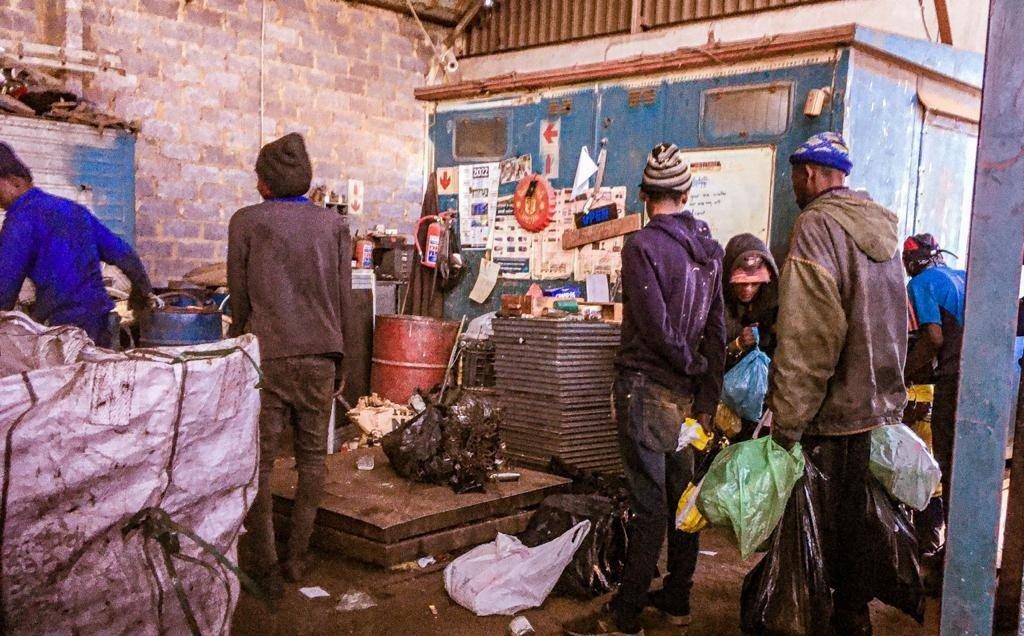Africa-Press – South-Africa. Recyclers and scrapyard owners in Sophiatown, Johannesburg, are concerned about the government’s proposal to ban the trade of metal and copper for six months.
However, it has been business as usual as the homeless in the area went through dump sites looking for scrap to recycle.
Some of them spoke to News24 about how the proposed policy would negatively impact their livelihoods as they bought food and paid rent using the money made from the scrap they sold.
Marie from Crazy Scrap said the policy would hinder business revenue, as people usually sold broken window frames and copper from broken home appliances to them.
According to Marie, who did not want to give her last name, the unfortunate thing about the government proposal was that she would now have to turn them away.
“We are a registered scrapyard, and we are very familiar with the types of copper that are off-limits.
“We don’t buy metal or copper stolen from public infrastructure as I will lose my licence.
“If a customer walked in today with this broken washing machine engine as it contains copper, he’s going to go buy food or something with the money,” Marie said.
Hundreds of people in Sophiatown rely on waste material to make a living.
The government wants to impose a six-month ban.
“Imposing a temporary (6-month) prohibition on the export of waste and scrap metal… will allow time for government to establish the regulatory regime that will apply once the export prohibition comes to an end, while reducing the immediate damage to public infrastructure,” the policy proposal stated.
According to Marie, she has been running her scrap business for 15 years. While talking to News24, she pointed to an old rusty lawnmower in the pile of recycled material, asking, “How is this affecting anyone?”
Abram Jakada, 49, has been making a living from recycled material for more than eight years. He said he was worried about what the proposed policy would mean for them.
“Life would not be the same without this. Recycling has created millions of jobs, and if they counted us, they would see how many of us are out there. These young ones are going to try and find different ways of making a living if the policy is imposed,” Jakada said.
Jakada, a father of five, lives near the dilapidated Newclare train station, where the building and tracks have been vandalised.
Govt proposes six-month scrap metal ban to combat cable theft
“Before I started with recycling, I registered with over seven scrapyards. I don’t sell to illegal scrapyards, and the identity card method is another strategic way for government to curb the illegal trade of copper,” Jakada said.
Department of Trade, Industry and Competition spokesperson Bongani Lukhele told News24 all role players in the industry could make submissions on how the move would impact them.
“We are engaging with stakeholders in considering what the way forward is. After we have received comments, we will sit down and go through them.
“The development of the new policy will be a long but inclusive process.
“We have started by putting out the proposals for comments by everyone affected or interested. After the closing date for comments, officials will go through all the inputs, and the final draft policy will take these into consideration,” Lukhele said.
Some Sophiatown residents trading bottles said as long as the policy didn’t affect them, they wouldn’t look for illegal avenues to make a living.
According to the government proposal, the two-month prohibition imposed during the 2020 lockdown did not cause serious harm to the industry.
However, Marie disagreed, explaining that it had been difficult for her to pay rent and buy food amid the Covid-19 pandemic.
She showed News24 her latest monthly earnings and said it had dropped by more than R20 000 compared to previous months. She said she was concerned about how the policy would impact her business and her workers.
For More News And Analysis About South-Africa Follow Africa-Press






